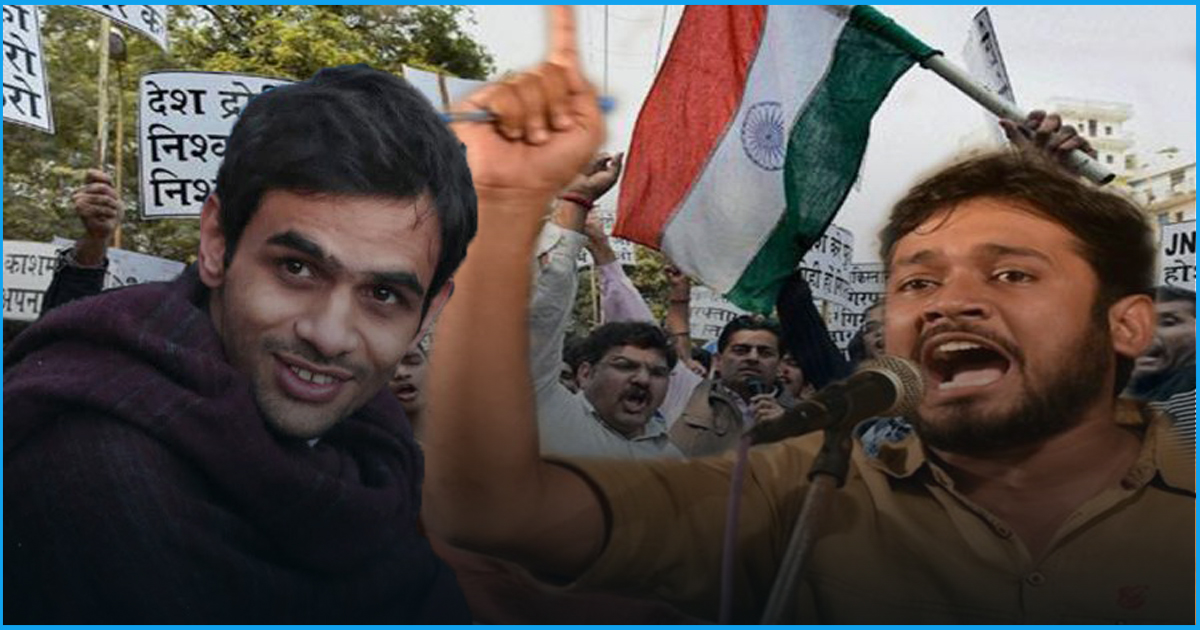
Two And A Half Years On, Delhi Police Yet To File A Charge Sheet In JNU Sedition Case
13 Sep 2018 3:13 PM GMT
Editor : Ankit Sharma Sharma
Green tea Addict | A Tree Hugger | Born for Change
Two years have passed since the controversial JNU (Jawaharlal Nehru University) sedition case, but till now Delhi police has not filed any charge sheet. Delhi police generally have to file a charge sheet within 90 days of an arrest as per Section 173 of CrPC but in this case, they failed to do so even after 900 days of the arrest, as The Times of India has reported.
Three JNU students were arrested by the Police
Delhi Police in February 2016 registered a case against three JNU students – Kanahiya Kumar, Umar Khalid and Anirban Bhattacharya under Section 124A (Sedition) but the case has not seen any trial till now. The case was later transferred to the Special Cell. On February 9, the Democratic Students Union (DSU) has organised the death anniversary of Parliament attack convict Afzal Guru titled ‘A country without a post office — against the judicial killing of Afzal Guru and Maqbool Bhatt’, where the alleged ‘anti-national’ slogan was raised by a group of students. The three students were arrested following the 9th February incident at JNU campus, however, released soon on bail. According to The Indian Express, two more charges under IPC Section 147 (Punishment for rioting) and 149 (Unlawful assembly) were added during the investigation of the case. The case was filed under IPC Sections 124A (sedition), 120B (criminal conspiracy) and 34 (acts done by several persons with a common intention). The case was reportedly registered by a police officer after he saw the video clipping on Zee News, in which the JNU students were allegedly raising ‘anti-national’ slogans.
Police failed to file the charge sheet and verify evidence in the last two years
As per the report of The Hindustan Times, the Police spokesperson and Special Commissioner of Police, Dependra Pathak has said in March 2017 that the police are still investigating the case and they will take time to file the charge sheet. He said “The case is still under investigation. It is a sensitive case so we would request everyone not to speculate. As of now, there is no finality. Chargesheet will be filed but not now.”
The police officials have maintained their silence when questioned about filing a charge sheet. However, The Times of India has reported that sources told them that though the police had found the evidence against the three students along with few other students from Jammu and Kashmir, the charge sheet was not filed throughout 2017 considering the situation in Jammu and Kashmir. A cop who was involved in the investigation has said, “Charging Kashmiri youths for sedition could have political ramifications and impacted the efforts being made to restore peace in the area”. The Police has questioned and found evidence against eight Kashmiri students, who were not part of JNU and came from different universities to take part in the protest. JNU has also taken action against several students in the same connection, and the VC has constituted a high power enquiry committee to probe into the matter.
The Indian Express has reported on February 9, 2018, that the police has said that the investigation of the case is almost done and they are waiting for the forensic report of the data belonging to the suspects. Police have also said that they are yet to verify the collected pieces of evidence.
Police asked 30 JNU students to join the probe
In April 2017, the special cell of police had sent notice to JNU vice-chancellor asking the 30 students from JNU to appear in the probe. Shehla Rashid and Aparajitha Raja were among the 30 students who were asked to join the probe. Shehla Rashid while speaking to The Indian Express said the police asked them questions like ‘have you ever been to Kashmir?’, ‘have you ever met a Kashmiri terrorist?’. “I replied accordingly. There were a few direct questions as well.”
“The case was just a polarisation mechanism”
Umar Khalid while speaking to The Quint has said that the case was never meant to be in the court of law, it was used as a polarisation mechanism in the domain of public opinion where they have been targeted as ‘anti-nationals’ and subjected to many hate campaigns, death threats.
The JNU row of 2016 had started a nationwide debate on free speech and freedom of expression. The accusation of nurturing ‘anti-national’ sentiment in JNU campus was made by many politicians and prominent figures, whereas many came forward in the support of JNU students. Umar Khalid was accused of having relations with terrorist groups and links in Pakistan. Home Minister Rajnath Singh went to the extent of saying that Lashkar-e-Taiba chief Hafiz Sayeed was secretly providing support to JNU students.
Also Read: All You Need To Know About The JNU Controversy And The Logical Indian’s Opinion On The Issue
Opinion: The Logical Indian Stands With JNU But Not With The Culprits; Sequence Of Events So Far
 All section
All section













